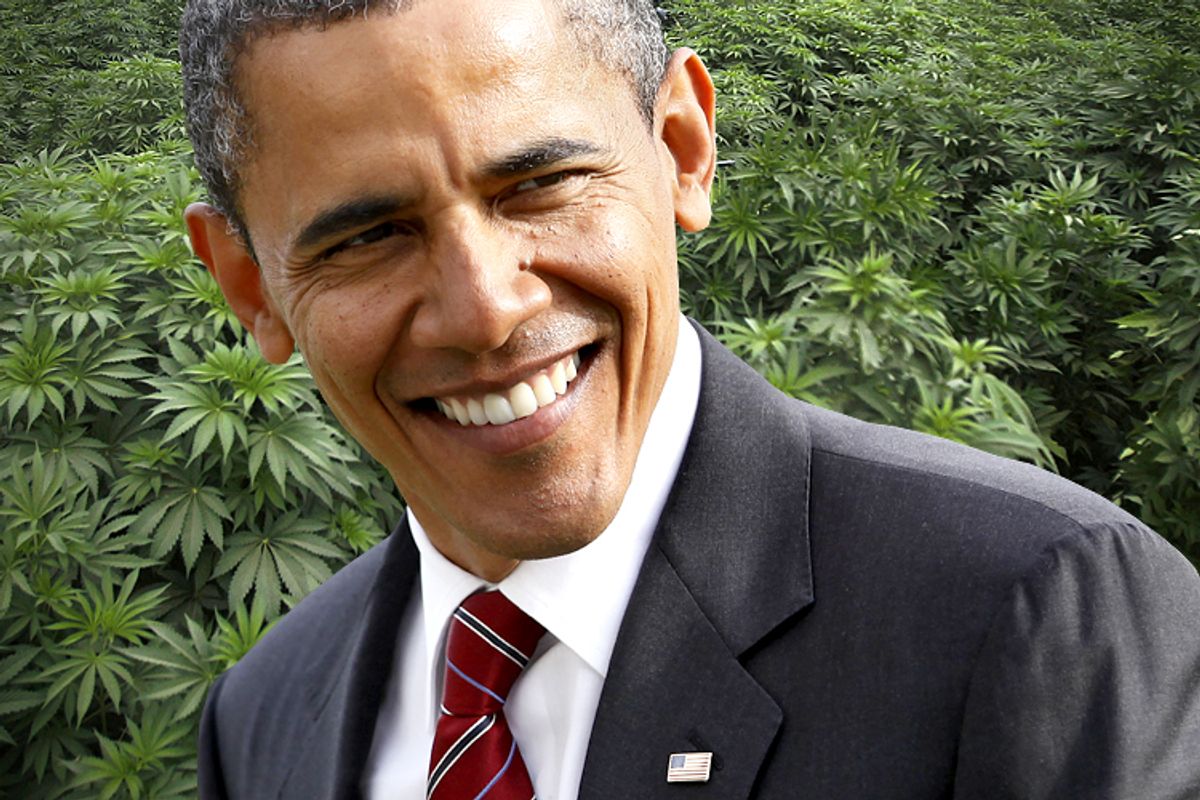Better late than never: Almost a year after citizens in Colorado and Washington voted to allow marijuana consumption, and only months after refusing to take a position on those ballot measures, the Obama administration yesterday announced it will not use its resources to obstruct the cannabis legalization process in those states. Coming only a week after the administration announced a separate sentencing reform initiative, the move seems to be part of a larger criminal justice shift by the administration -- one that represents a rare instance when the Second Term Fantasy could ultimately come true.
You likely know this fantasy from those talking points so often repeated by a presidential incumbent's supporters during that incumbent's reelection campaign. "Once our guy gets reelected," the line goes, "he will finally have the freedom to do all the really good stuff he really wants to do but can't do."
History shows that for the most part, the Second Term Fantasy usually ends up being just that: a fantasy designed to motivate supporters who tend to be (understandably) demoralized by all of a president's first term betrayals. Up until now, President Obama's tenure has largely followed that script, with his second term marked not by the progressive initiatives he allegedly supports in his heart, but instead by (among other things) revelations of an authoritarian expansion of the surveillance state, a Nixonian war on the press, a continued commitment to budget austerity and intensifying drone assaults on civilian populations.
But now come the moves on criminal justice -- moves that signal a president actually using the freedom from reelection concerns to push long-term change.
The marijuana move is particularly surprising considering all the flip-flopping. Indeed, with this new announcement, Obama was for letting states reform their marijuana laws, before he was against it before he is now for it again.
Remember, candidate Obama in 2008 declared that "I'm not going to be using Justice Department resources to try to circumvent state laws" about marijuana consumption. He followed that up with a 2009 Justice Department memo seeming to instruct federal drug enforcement agencies to defer to local officials in states that had reformed their marijuana laws. The moves were refreshingly consistent; as a guy who smoked his share of ganja, Obama seemed determined to start ending the prosecution of people who did what he did as a member of the Choom Gang.
But then in the lead-up to the 2012 election, Obama reversed himself. First, the Justice Department issued a "clarifying" memo all but reversing the 2009 memo. Meanwhile, Rolling Stone reported that the administration "quietly unleashed a multiagency crackdown on medical cannabis that goes far beyond anything undertaken by George W. Bush." These included draconian prosecutions and over-the-top raids.
When Colorado and Washington passed their ballot measures in 2013, the administration initially continued those raids -- even those in one of the states that had voted to fully legalize weed. Additionally, when forced through the White House petition system to answer whether it would respect states' right to treat marijuana like the legal drug alcohol, the administration in January categorically refused to say yes.
Now, though, comes an apparent reversal of the reversal, as the administration now says it will not interfere with Colorado and Washington as those states implement systems to legalize, regulate and tax the production and recreational consumption of marijuana.
Of course, the aforementioned word "apparent" is absolutely critical because the latest Justice Department directive specifically reserves the right to once again reverse its position. Officially, it reserves this right in the name of protecting the country from the dangers of drug culture - but that's government-ese for reserving the right to shift positions if the polls in support of marijuana legalization suddenly change.
It should go without saying that such volatility in the nation's drug laws aren't good for anyone. It confuses law enforcement agencies and complicates the long-term planning that the marijuana business, state tax officials and local regulators need to engage in. Ending that uncertainty could happen through two straightforward steps: 1) Congress could act to legalize marijuana, or at least statutorily bar the feds from preempting state laws legalizing marijuana, or 2) the president could use the power he already has under federal narcotics laws to fully legalize weed.
In past attempts to dodge tough questions, Obama has tried to pretend he doesn't have this authority. But as the Christian Science Monitor notes, the 1970 Controlled Substances Act gives the president the clear "legal authority to relabel marijuana as either a less dangerous drug or ... classify it alongside alcohol as a legal drug."
With the war on marijuana involving so many social ills -- it is racist, it is hugely expensive, it fails to address more serious drug addiction issues -- the administration's announcement this week is no doubt a step toward actualizing the Second Term Fantasy.
But to truly make that fantasy a concrete reality there's one last step, and fortunately, it is a step that the president already has the power to take.



Shares